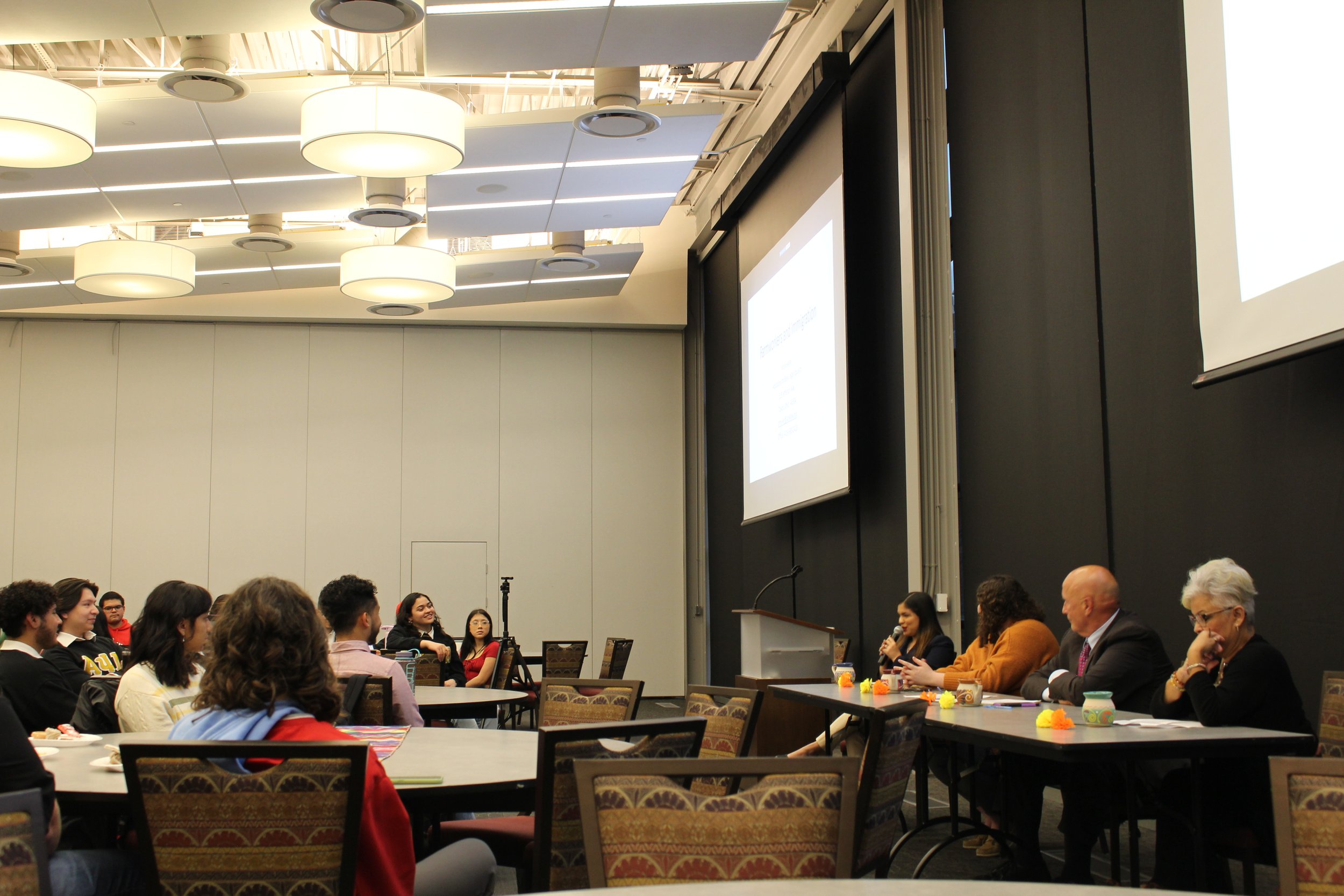"Farm to Table” Event Strives to Educate Students on Migrant Farm Worker Struggles
“Farm to Table” Panelists dive deep into discussion with students at Curl Viewpoint North.
Credit: Arianna Smith
By Arianna Smith
When was the last time you thought about where your food came from, and who provided it? A town hall hosted by Alpha Psi Lambda asked its audience to contemplate the answer.
Lauren González, a second-year in public management and leadership and policy, and the Alpha Psi Lambda fraternity set to answer these questions in their town hall meeting “Farm to Table.” On Thursday, Gonzáles facilitated and moderated the “Farm to Table” event with much help from her fraternity Alpha Psi Lambda, which aimed to educate students and community members on the struggles of migrant farm workers and the importance of their work.
The panelists of this event were Maria Martinez, board of commissioner for the Ohio Commission on Hispanic and Latino Affairs, Laura Nadal, community organizer for Justice for Migrant Women, and Mark Heller, an immigration lawyer.
González said that she was inspired to host this event after speaking with Mark Grossman, press secretary for Cesar Chavez, about the Farmer Workforce Modernization Act, a bill granting benefits to migrant farm workers by providing certified agricultural worker status and updates to the H-2A temporary worker program, according to congress.gov.
She said she learned how monumental this legislation could be for migrant farm workers while also educating Ohio residents, who may not have an understanding of these struggles in the Latinx community, unlike regions with a larger Latinx population like Texas.
“And with the past four years I just knew that this midterm election could be so amazing, but it could be detrimental if the certain candidates who win who are running on their extremist racist agendas win, González said.” “So I, I thought to myself, I need to, I need to do something, I need to educate the community about something and so my friend Carlos, who is my brother in April, he said why don’t you do a town hall.”
González said that she used resources and networked with people from her job, her brothers and sisters in Apis and the Interim Vice Provost for the Office of Diversity and Inclusion, Yolanda Zepeda, to find panelists for the “Farm to Table” town hall event.
“This entire summer, I spent my summer calling people, emailing people, asking people to connect me to this person and this person,” González said.
Nadal, a panelist at the event, said she wanted the audience members to leave with more knowledge about what struggles farm-working women face and a sense of urgency to share their stories.
Nadal also said that voting can always make a difference when referencing the upcoming midterm elections.
“I think voting always makes an impact because we’re pushing and fighting for the things that we deem as correct and right and, we’re trying to rectify the wrongs that have been set out,” Nadal said.
Nadal said that she urges students and community members to check out news articles shared and posted on their website, justice4women.org, and social media pages, mujerxrising, to stay informed on migrant farm workers and their continuous struggles.
González said that she encourages students to follow the United Farm Workers Union on Instagram to stay informed on the impact they have on our lives while also urging students to pressure politicians into putting farm worker struggles as a top priority and policy issue.
“Pressure politicians to start putting that as a top issue, because you know, that’s why immigration reform hasn’t happened in 30 something years,” González said.
González said that she hopes to continue advocacy work in the future with her Alpha Psi Lambda family while earning her degree and wants to introduce a pilot program for children of migrant workers through her fellowship with Unidos US.
“I know that my story has power and I know that some people in this room personally told me that they were touched because they have been through the same thing, and I don’t feel like you hear that a lot in politics because there is only 1.5 percent of me in office,” González said. “So that’s how I keep doing it, keep putting my name out there, my story, to get people to understand why you should care.”
